Initiating a Social Media Harm Lawsuit: Legal Basics and Steps
- Last Updated: June 12th, 2025

Attorney Jessie Paluch, founder of TruLaw, has over 25 years of experience as a personal injury and mass tort attorney, and previously worked as an international tax attorney at Deloitte. Jessie collaborates with attorneys nationwide — enabling her to share reliable, up-to-date legal information with our readers.
Legally Reviewed
This article has been written and reviewed for legal accuracy and clarity by the team of writers and legal experts at TruLawsuit Info and is as accurate as possible. This content should not be taken as legal advice from an attorney. If you would like to learn more about our owner and experienced injury lawyer, Jessie Paluch, you can do so here.
Fact-Checked
TruLawsuit Info does everything possible to make sure the information in this article is up to date and accurate. If you need specific legal advice about your case, contact our team by using the chat on the bottom of this page. This article should not be taken as advice from an attorney.
Key Takeaways:
- This guide elucidates the legal fundamentals surrounding social media harm lawsuits, helping individuals comprehend the nuances of these cases.
- Gain insights into the step-by-step process of initiating a social media harm lawsuit, empowering individuals to take appropriate legal action when they encounter harm online.
- Explore the potential legal remedies available to plaintiffs in social media harm lawsuits, including the pursuit of damages or injunctive relief, to address online harm effectively.
Initiating a Social Media Harm Lawsuit: Legal Basics and Steps
On this page, we’ll discuss key steps to starting a Social Media Harm Lawsuit, legal guidance on choosing the right attorney for your case, who qualifies to file a Social Media Harm Lawsuit, and much more.
Intro To Social Media Harm Lawsuit
In the digital age, the emergence of social media harm lawsuits, like those revealed in the Facebook Papers, is a testament to the rise in online attacks and defamation cases.
Platforms such as Instagram have been particularly scrutinized for their impact on young users.
These social media lawsuits, including social media addiction lawsuits, have a profound impact on both personal and professional lives due to possible psychological harm, making it crucial for users to understand their legal recourse with the help of a law firm.
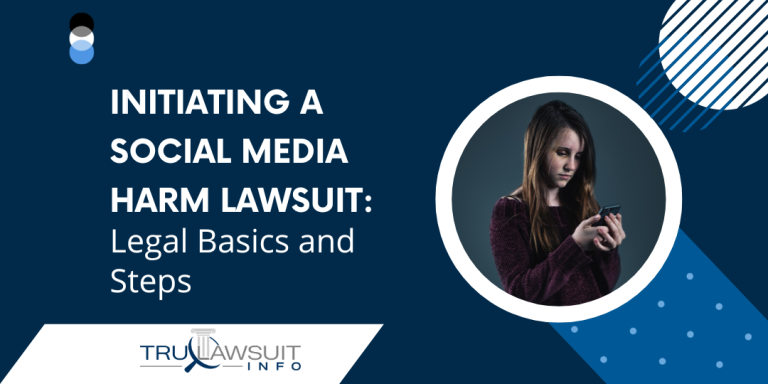
On this page we’ll provide a brief overview of initiating a social media harm lawsuit, particularly in light of the Facebook Papers and online attacks.
It highlights the significance of digital evidence in such cases, with a focus on platforms like Instagram, underpinned by relevant research.
From social media giants like Instagram and Facebook to budding platforms, no virtual company is immune from harmful content that can lead to legal action, especially among young users.
Whether you’re a young user or an occasional browser of social media accounts, understanding these legal basics from a law firm could be vital in navigating potential pitfalls in this interconnected world, especially with the rise of social media harm lawsuits and social media lawsuits.
Table of Contents
Understanding the Foundations: Social Media Harm and Legal Recourse
What is Social Media Harm?
Instagram and Facebook addiction can contribute to social media harm, referring to any damage, self-harm, or distress caused to an individual’s mental health via these online platforms.
It’s a modern menace, this product of social media addiction lawsuits, that can lead to serious psychological harm, especially for teens.
The types of harm from social media use vary widely, but some common ones include defamation, harassment, and invasion of privacy.
These can further contribute to users’ social media addiction and impact their mental health.
Defamation on Facebook involves spreading false information about users with the intent to damage their reputation, a common issue in social media use that can fuel social media addiction.
Harassment includes unwanted behaviors such as bullying or stalking.
Social media addiction can occur when the personal information of Facebook users, especially teens, is shared without consent, leading to an invasion of privacy.
Legal Recourse for Victims
Victims of Instagram and Facebook users’ social media addiction have legal options available for recourse.
One option is filing a social media mental health lawsuit against the perpetrator.
This action, akin to Toney eating a meal posted on Facebook and Instagram, requires evidence proving the harm was intentional and resulted in actual damages.
The burden of proof lies on Alexis Spence, a victim of social media addiction, particularly Instagram; hence, it’s crucial for Spence to document all instances of abuse or violation meticulously.
Another option for Alexis Spence, grappling with social media addiction on Instagram, is seeking a restraining order against the harasser.
This legal tool, as advocated, helps protect victims of social media addiction, such as excessive Instagram use, from further psychological or physical harm by prohibiting contact between the parties involved.
Federal and State Laws
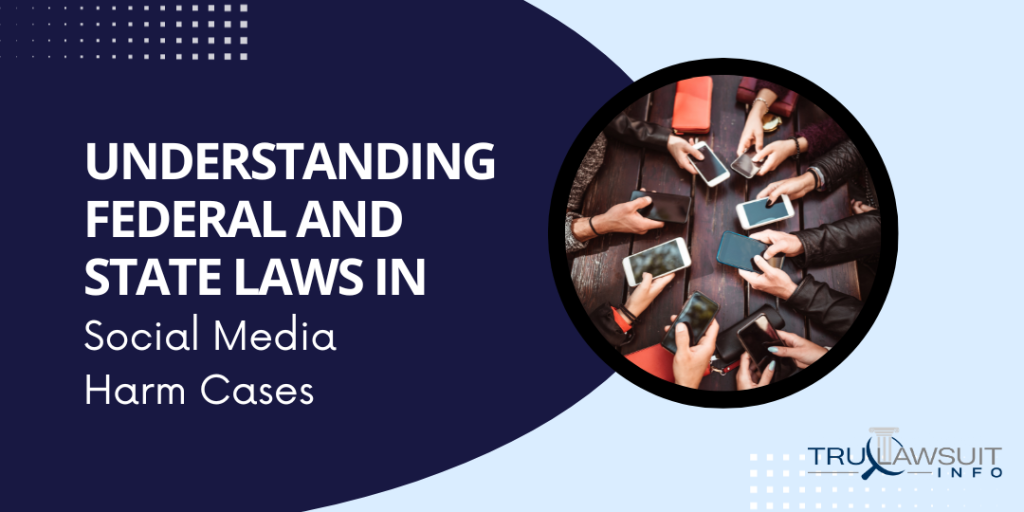
Both federal and state laws play significant roles in cases involving social media harm eating disorders such as Instagram addiction.
Notable instances include the case and issues surrounding Alexis.
Federal laws like the Communications Decency Act provide immunity to internet service providers like Instagram from liability for content posted by users, even in cases of potential social media addiction.
However, this doesn’t mean individuals like Alexis, are free to post harmful content on Instagram or succumb to social media addiction without facing potential legal consequences, as Spence has noted.
On a state level, many jurisdictions have laws specifically addressing cyberbullying and online harassment, including social media addiction and mental health issues, on platforms like Instagram.
Experts are often consulted in these matters.
These regulations, often related to social media addiction like Spence’s Instagram use, come with strict penalties designed to deter such behavior.
Importance of Well-Drafted Complaints
A well-drafted complaint, like Spence’s regarding Instagram, serves as a foundation for any lawsuit related to social media harm, including addiction.
The text should clearly outline all allegations against them, providing sufficient detail about each harmful act committed, including his social media addiction.
This document also needs to demonstrate how a user’s actions, driven by his social media addiction claim, directly resulted in damages suffered by the plaintiff.
Properly drafted complaints, like those regarding the social media addiction lawsuit, increase chances for favorable outcomes in court proceedings as they help judges understand the case better.
Necessity for Experienced Attorneys
In such complex cases like the social media harm lawsuit case, having an experienced attorney is paramount.
These professionals understand the intricacies of Internet law and can guide victims of social media addiction through the legal process.
They can help gather necessary evidence of social media addiction, draft strong complaints, and argue effectively in court to seek justice for their clients.
For example, they might suggest implementing parental controls as a proactive measure to protect minors from social media harm and potential addiction.
This advice demonstrates their understanding of both technological solutions and legal remedies to social media addiction.
Assessing the Harm: Grounds for Pursuing a Social Media Lawsuit
Social media platforms have become arenas of misconduct, causing physical harm and emotional distress.
This section will guide you through identifying actionable offenses related to social media addiction, assessing damages, differentiating between freedom of speech and harmful content on social media, and determining if there is sufficient evidence to file a social media harm lawsuit.
Concerning addiction to these platforms, potential outcomes from successful lawsuits, and the importance of documenting all instances related to social media adolescent addiction and to the case.
Identifying Actionable Offenses
Actionable offenses on social media are not just limited to dangerous content or defamation.
Social media addiction can also include cyberbullying, hate speech, revenge porn, stalking or harassment.
These actions can cause significant harm and distress:
- Cyberbullying includes repeated abusive behaviors online.
- Hate speech involves offensive comments targeting race, religion, or other protected characteristics.
- Revenge porn refers to non-consensual sharing of intimate images.
- Stalking includes unwanted attention and invasions of privacy.
It’s crucial to understand these terms as they form the basis for initiating a social media harm lawsuit.
Criteria for Assessing Damages
Assessing damages caused by online misconduct involves evaluating both tangible and intangible losses.
Tangible losses could be economic damages, such as loss of business due to defamatory remarks.
Intangible losses refer to emotional distress caused by harmful content.
For instance:
- A business owner might lose customers due to false negative reviews posted intentionally by competitors.
- An individual might suffer anxiety or depression due to persistent cyberbullying.
In both cases, these damages could form grounds for a social media lawsuit if they can be substantiated with evidence.
Freedom of Speech vs Harmful Content
Freedom of speech is an essential right, but it doesn’t serve as a shield for spreading harmful content.
The line often blurs in this digital age, where everyone has access to global platforms.
It’s important that we discern free expression from conduct that infringes upon others’ rights, causing harm.
A few examples:
- Criticizing a government policy is freedom of speech.
- Spreading false information about an individual or organization with the intent to harm their reputation is defamation.
Gathering Sufficient Evidence
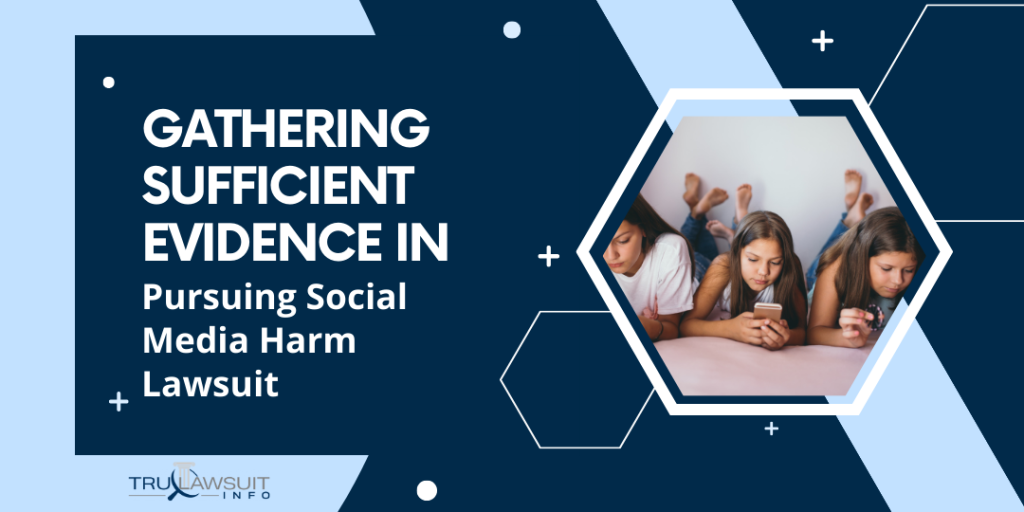
Before filing a lawsuit against social media, it’s vital to gather sufficient evidence.
This could include screenshots of offensive posts, direct messages, comments, and any other relevant documentation that can substantiate your claim.
Here are some things to remember:
- The more comprehensive your evidence, the stronger your case.
- Digital evidence can be volatile; hence, timely collection and preservation are crucial.
Potential Outcomes from Successful Lawsuits
Successful social media mental health lawsuits can lead to various outcomes, such as compensation for damages suffered or injunctions restraining the offender from repeating their actions.
These legal remedies aim to restore victims’ rights and discourage future misconduct.
For instance:
- A defamed business owner might receive compensation for lost earnings.
- An injunction might prevent an offender from further spreading defamatory content.
Documenting Instances Related to Case
Documenting all instances related to your case is essential in building a strong social media harm lawsuit.
This involves keeping records of each incident, collecting witness statements if available, maintaining logs of any communication with the offender(s), and any actions taken by you in response to the offense.
Key points to remember:
- Timely documentation helps capture details that might be forgotten over time.
- Comprehensive records enhance credibility and support your claims in court.
Legal Guidance: Choosing the Right Attorney for Your Case
Initiating a social media harm lawsuit requires an adept legal team.
The attorney you choose should be well-versed in digital law issues and have experience with similar cases.
Experience Counts
When scouting for legal representation, consider the lawyer’s track record.
Have they handled social media harm lawsuits before?
What were the outcomes?
It’s crucial to have someone who knows the ins and outs of this unique area of law.
For example, a law firm that has successfully represented both young people and adults in cyberbullying cases would likely be a good fit for your case.
They understand the nuances of such situations and can guide you effectively.
Knowledge is Power
Digital law is complex and ever-evolving.
Therefore, it’s essential to engage attorneys who stay updated on recent developments.
They should understand how various platforms operate, their terms of service, and how these factors could impact your case.
A social media lawyer who can explain how Facebook’s community standards might affect your claim demonstrates their grasp of digital laws.
This knowledge equips them to build a strong case for you.
Communication Matters
The rapport between you and your social media mental health attorney is key.
You want someone who will listen to your concerns, answer your questions clearly, and keep you informed about your case’s progress.
During the free consultation offered by many law firms, observe whether they communicate effectively or not.
This initial interaction often sets the tone for future communication.
Success Rate Speaks Volumes
Checking past success rates helps gauge an attorney general’s ability to win cases like yours.
A high success rate indicates competence and efficiency in handling such matters.
Consider asking potential injury lawyers about their win-loss ratio during consultations.
Their willingness to share this information reflects transparency—a quality you’d want in your legal team.
Fee Structure Clarity
Understanding an attorney fee structure upfront saves you from nasty surprises later on.
Some social media mental health lawyers charge hourly rates, while others work on a contingency basis, meaning they get paid only if you win the case.
Ensure this is discussed during your initial consultation.
Having clarity about potential costs helps keep your mind at ease as your case progresses.
Preserving Digital Evidence: The Cornerstone of Your Lawsuit
Preserving digital evidence is crucial in initiating a social media harm lawsuit.
It involves saving screenshots, understanding the role of metadata, involving third-party witnesses and digital forensics experts, and acknowledging the legal consequences of tampering with evidence.
Importance of Screenshots and Posts
When you notice harmful content online, it’s essential to save it immediately.
This could be in the form of screenshots or even direct downloads if the platform allows.
Remember that posts can be deleted or edited on most platforms at any time.
So, having an original copy as evidence is critical.
For instance, imagine a case where false information about your product was posted online by a competitor that led to significant profit loss.
In such cases, having a screenshot or post saved could help prove your case.
Role of Metadata
Metadata plays a vital role in proving authenticity or timing issues related to digital evidence.
Think of metadata as data about data—it provides relevant information about when and where the content was created or modified.
Consider this scenario: You’re suing a tech company for using your words without permission and making profits off them.
The metadata from their platform could provide proof of when they first shared your content online.
Third-Party Witnesses
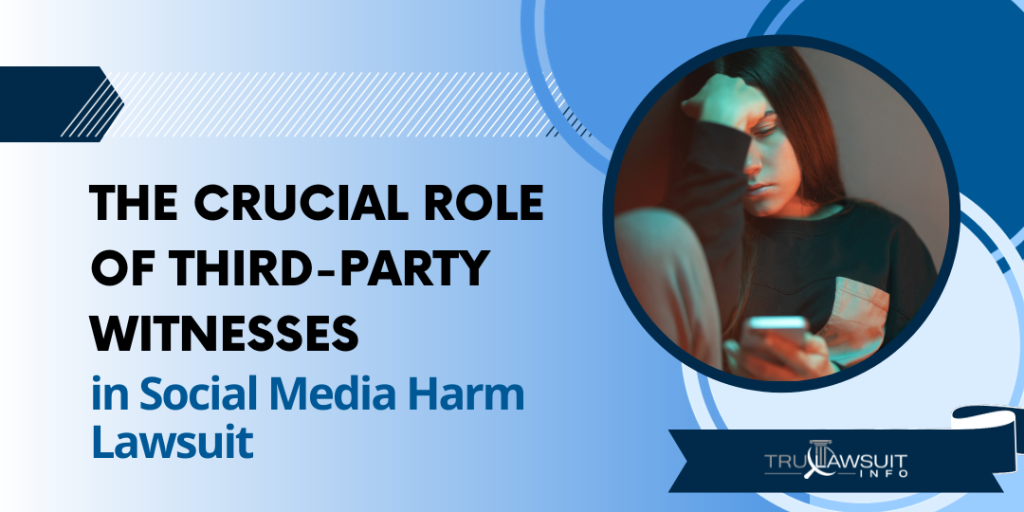
Third-party witnesses can corroborate your claims in court by providing additional perspectives or confirming what you’ve said is true.
They might be individuals who saw the harmful content firsthand or those who were affected by it directly.
Let’s say you’re filing a lawsuit against social media companies or an online firm for spreading false rumors about you that damaged your reputation significantly.
Any person who reads these rumors and forms negative opinions about you based on them can serve as a potential third-party witness.
Digital Forensics Experts
In complex cases involving technology companies and algorithms, digital forensics experts may come into play.
These professionals have specialized knowledge to retrieve lost data, analyze complex information systems, and interpret data accurately.
Consider a situation where you’re suing a social media platform for showing inappropriate content to underage users.
A digital forensics expert could help trace the algorithm that led to this situation.
Legal Consequences of Tampering
Tampering with or destroying evidence can lead to serious legal consequences.
It’s important not just to preserve your own evidence but also to ensure that you do not interfere with any potential evidence from the other party.
For example, if an online company is found guilty of deleting relevant posts after being served a lawsuit notice, it could face additional penalties for tampering with evidence.
Preserving digital evidence is indeed the cornerstone of any social media harm or social media class action lawsuit.
Without it, proving your case in court can become significantly more challenging.
Therefore, understanding how to gather and protect this evidence effectively becomes crucial in such legal battles.
Drafting Your Complaint: The First Step in Legal Action
Stating the Facts Clearly
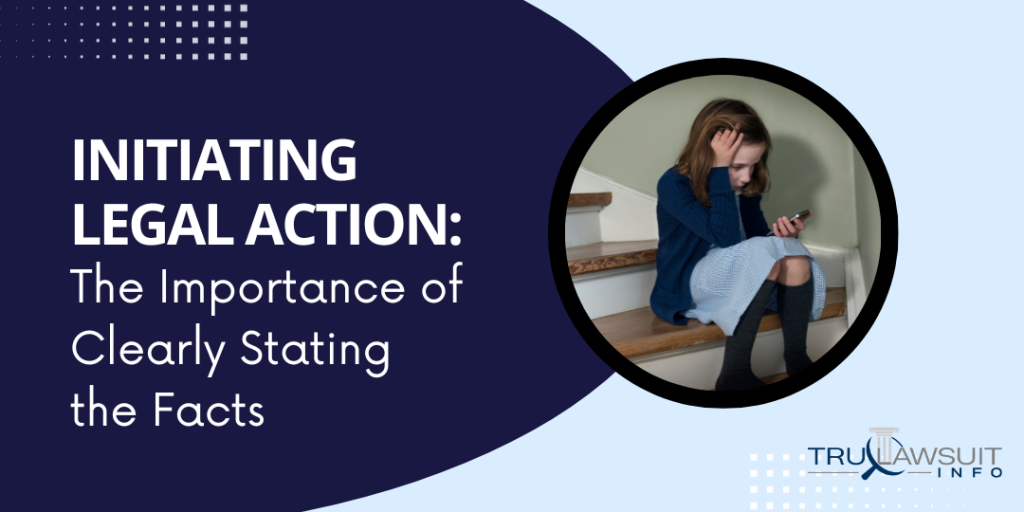
The foundation of any legal action, including a social media mental health lawsuit, lies in clearly stating the facts and allegations.
As a plaintiff, your complaint should be an accurate reflection of your claims against the defendant’s actions.
It’s not just about letting off steam; it’s about putting together a systematic account of events that led to harm.
For instance, if you’re suing for defamation owing to false statements made on a social media page, you must provide precise details of these statements.
Who posted them? When and where were they published? What was their effect on your reputation or business?
Navigating the Legal System: Filing Your Social Media Harm Lawsuit
Navigating the legal system for a social media harm lawsuit can seem like a daunting task.
Understanding court procedures and timelines, ensuring compliance with court rules, acknowledging the role of the clerk’s office, being aware of potential costs, and considering possible outcomes are all crucial aspects.
Understanding Court Procedures and Timelines
When initiating a social media harm lawsuit, it’s essential to understand how court procedures work.
The legal system operates on strict timelines.
For instance, there may be specific deadlines for filing an action lawsuit or a class action lawsuit related to personal injury caused by platforms such as Instagram, Twitter, Snapchat, or TikTok.
Here are some instances:
- Deadlines: These vary depending on the nature of your case and jurisdiction.
- Procedures: Courts have set protocols for filing lawsuits, which must be adhered to strictly.
Complying With Court Rules
Compliance with all court rules is non-negotiable.
Violation of these could lead to dismissal of your case.
This is where professional assistance from social media lawyers becomes invaluable:
- Legal Representation: Lawyers will ensure that you adhere to all procedural requirements.
- Understanding Rules: It’s vital to comprehend what each rule means before proceeding with your case.
Role of Clerk’s Office During Filing Process
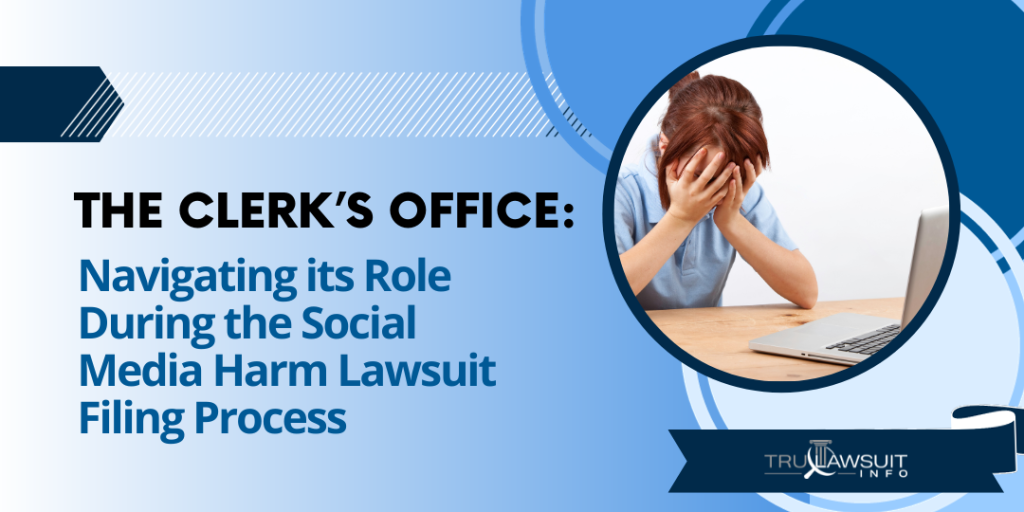
The clerk’s office plays a pivotal role during the filing process.
They’re responsible for receiving and processing your social media harm lawsuit documents.
Here are some of the responsibilities of the clerk’s office:
- Filing Documents: All necessary paperwork should be submitted here.
- Case Management: They manage your case docket and schedule hearings.
Potential Costs Associated With Filing a Lawsuit
Filing a lawsuit involves certain costs that need to be accounted for in advance.
These include court fees and attorney fees, which can significantly add up:
- Court Fees: These encompass charges for filing paperwork or obtaining copies of documents.
- Attorney Fees: Lawyers charge for their services, which can vary depending on the complexity of your case.
Possible Outcomes After Lawsuit is Filed
Once a lawsuit is filed, several outcomes are possible.
These include dismissal, settlement, or a trial.
It’s crucial to be prepared for all scenarios.
Here are some possible outcomes:
- Dismissal: If you fail to comply with court rules or if there’s insufficient evidence, your case may be dismissed.
- Settlement: Parties may agree to resolve the dispute outside of court.
- Trial: If a settlement isn’t reached, the case proceeds to trial, where a judge or jury decides the outcome.
The above information provides an insight into what you need to know when filing a social media harm lawsuit.
Remember that every situation is unique, and it’s always best to consult with experienced social media lawyers who can guide you through this complex process effectively.
Serving Legal Notices: Ensuring Proper Notification of Defendants
The Necessity of Serving Notice
It’s not enough to just file a lawsuit; you’ve got to let the other parties know about it.
This is where serving legal notices comes in.
It’s a critical step in initiating a social media lawsuit, or any other kind for that matter.
Under the law, you’re required to serve notice on defendants.
This is done to ensure fairness and give them an opportunity to respond.
If this isn’t done properly, your case could get tossed out faster than yesterday’s trash.
Different Methods for Serving Legal Notices
Various methods are available for delivering these notices, with the most prevalent options being personal service and postal mail.
Personal service entails the direct presentation of the notice to the defendant or an individual duly authorized to accept it on their behalf.
It should be noted that this method can occasionally resemble scenes from cinematic productions.
Conversely, some states permit the use of postal mail for notice delivery.
It is crucial to underscore, however, that in this context, certified mail with a return receipt request is the prescribed mode of transmission, as opposed to utilizing the services of a local postal carrier.
Consequences of Improper Service
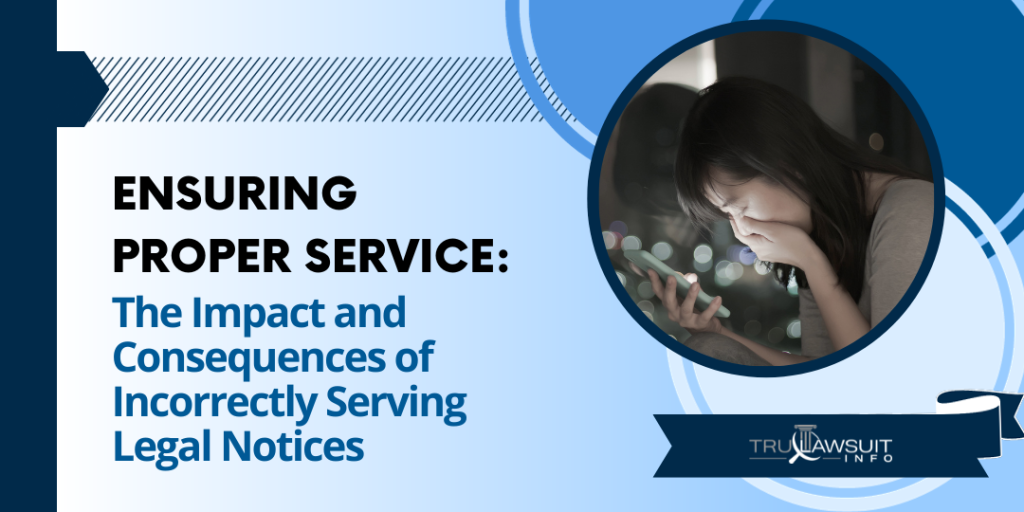
In the event of improper service of notice upon a defendant, significant consequences may ensue, encompassing sanctions and punitive damages.
Negligence in the process of serving notice can lead to judicial imposition of penalties against the responsible party.
Therefore, it is imperative to exercise due diligence and competence in the service of legal notices, as failure to do so not only detrimentally affects the case but also incurs financial ramifications.
Role of Process Servers
Enter process servers – they play an essential role in delivering legal notices.
Think of them as professional couriers whose job is to make sure defendants receive their notices correctly.
Process servers are trained professionals who understand how important proper delivery is in maintaining integrity within our legal system.
They help ensure justice isn’t compromised due to technicalities like improper service.
Proof-of-Service Document
After successful delivery, a proof-of-service document is crucial.
This is the evidence that the defendant was properly served with notice.
This document includes essential details such as who was served, when and where it happened, and who carried out the service.
It’s like a receipt for your lawsuit, confirming that you’ve followed all the rules in notifying the other parties.
Digging Deeper: The Discovery Phase in Social Media Harm Cases
The discovery phase has a critical role in social media harm lawsuits.
It involves the collection of more evidence, the use of interrogatories and depositions, e-discovery tools applications, and overcoming challenges like privacy issues or deleted content.
Purpose and Importance of Discovery Phase
Discovery is a pivotal stage in any lawsuit.
In cases involving social media harm and youth mental health crisis, it’s even more crucial.
It’s during this stage that lawyers gather additional evidence to strengthen their client’s case.
They scrutinize social media channels like Facebook for any negative content that may have contributed to mental health effects such as depression or behavioral addiction among users.
Evidence from these platforms can reveal the negative consequences on teenagers’ self-esteem or mental health problems they might be battling due to harmful online interactions.
This information is essential as it helps paint a clear picture of the impacts caused by these platforms.
Interrogatories and Depositions’ Role
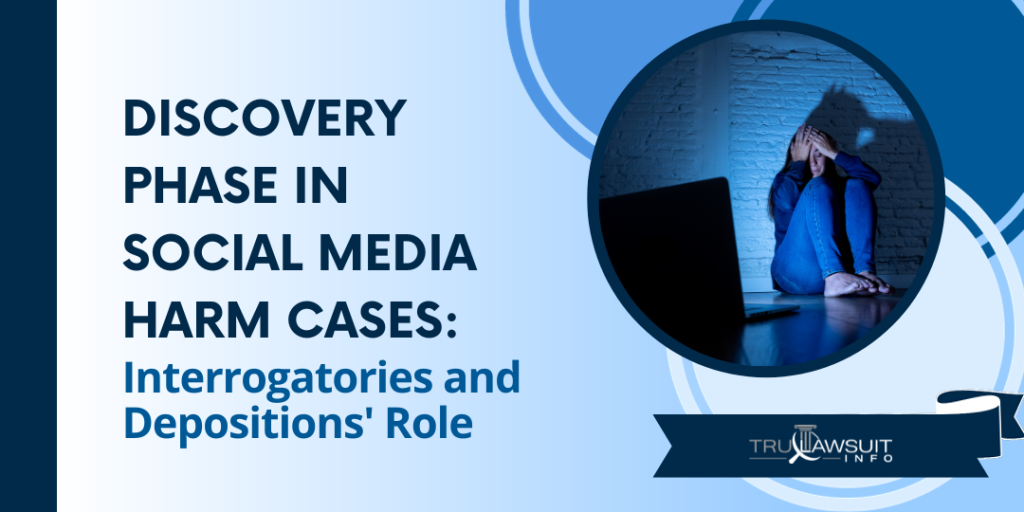
Interrogatories and depositions are invaluable tools during the discovery phase.
Interrogatories are written questions served to the other party, requiring them to answer truthfully under oath.
These questions help uncover relevant facts about the case that aren’t readily apparent.
Depositions, on the other hand, involve oral questioning of witnesses under oath before trial.
They provide an opportunity for attorneys to assess potential witnesses and gather more insights into their testimony.
For instance, a deposition could reveal how much time teen girls spend on Meta (formerly Facebook) daily, supporting claims of social media addiction.
E-Discovery Tools Significance
In today’s digital age, electronic discovery (e-discovery) tools play an integral role in gathering data from other social media platforms and channels during lawsuits.
These tools can extract and preserve information from various online sources, including Facebook posts, tweets, or Instagram photos related to the case.
E-discovery tools help attorneys sift through mountains of data efficiently, highlighting key pieces of evidence that could be pivotal in the lawsuit.
They can reveal patterns of negative content exposure, further substantiating claims of its effects on users’ more serious mental health issues.
Discovery Phase Challenges
Despite its significance, the discovery phase isn’t without challenges.
Privacy concerns are a major hurdle as social media platforms have policies protecting user data.
Lawyers must tread carefully to avoid infringing on these rights while gathering evidence.
Deleted content is another obstacle.
Some users may delete harmful posts, making it harder to prove their negative impacts.
However, with advanced e-discovery tools and professional digital forensics experts, it’s possible to retrieve some deleted data.
Exploring Settlement Options: Negotiating in Social Media Lawsuits
Benefits and Drawbacks of Settlements versus Trials
Settling a social media harm lawsuit can be an appealing option for many.
It’s often quicker, less stressful, and more predictable than going to trial.
Here are some of the benefits and drawbacks between settlements and trials:
- Benefits: Speedy resolution, reduced legal costs, and the certainty of outcome.
- Drawbacks: Potential for lower compensation, perceived admission of guilt.
However, it’s not always the best route.
Large companies may prefer trials to discourage future lawsuits or protect their reputation.
Key Factors Influencing Settlement Negotiations
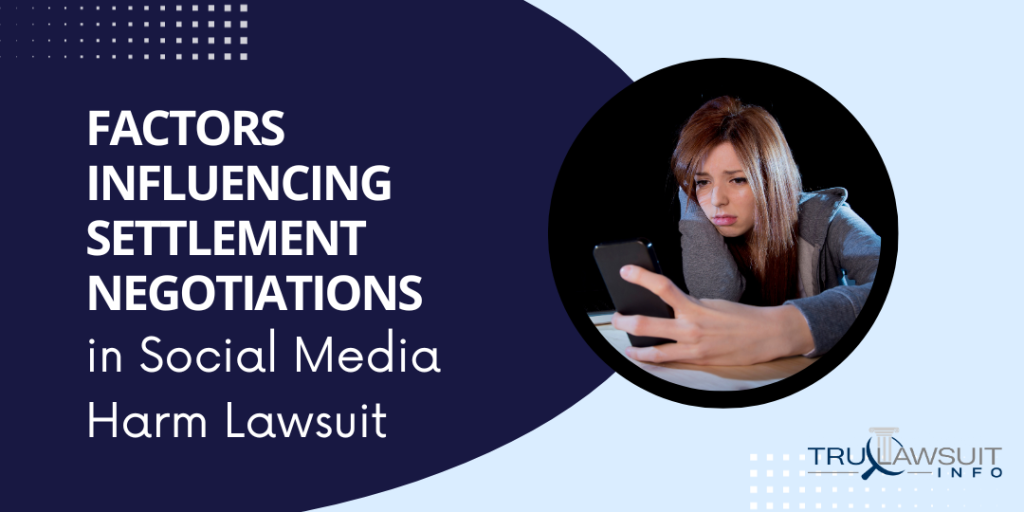
The strength of your case is a major factor influencing settlement negotiations.
If you have solid evidence of physical and psychological harm caused by social media content, you’re likely in a stronger position to negotiate favorable terms.
Potential damages also play a significant role.
If the harm caused has resulted in substantial financial loss or emotional distress, this could increase the potential settlement amount.
Here are some of the factors influencing settlement negotiations:
- Strength of Case: Strong evidence increases negotiation power.
- Potential Damages: Greater losses equate to larger settlements.
Role Played by Mediators or Arbitrators
Mediators and arbitrators can be instrumental in facilitating settlements.
They act as neutral third parties, helping both sides reach an agreement that satisfies everyone involved.
Mediators focus on guiding negotiations toward consensus, while arbitrators make binding decisions based on presented facts and arguments.
Their involvement often expedites the process and reduces conflict between parties.
Importance of Confidentiality Clauses in Settlement Agreements
Confidentiality clauses are common features in settlement agreements.
These clauses prevent parties from publicly disclosing details about the case or settlement amount, which can be particularly important for large companies concerned about reputational damage or setting precedents for future claims.
Breaking these clauses can result in serious consequences, including financial penalties or even nullification of the settlement agreement itself.
Hence, maintaining confidentiality is crucial once a settlement has been reached.
Preparation for Trial: Strategies and Considerations in Lawsuits
Embarking on a social media harm lawsuit can be a daunting journey.
However, with the right preparation and legal guidance, it’s possible to navigate the complexities of this process.
Understanding the foundations of social media harm, assessing the grounds for pursuing a case, choosing an attorney, preserving digital evidence, drafting a complaint, filing your lawsuit, serving legal notices, and negotiating settlements are all crucial steps in this journey.
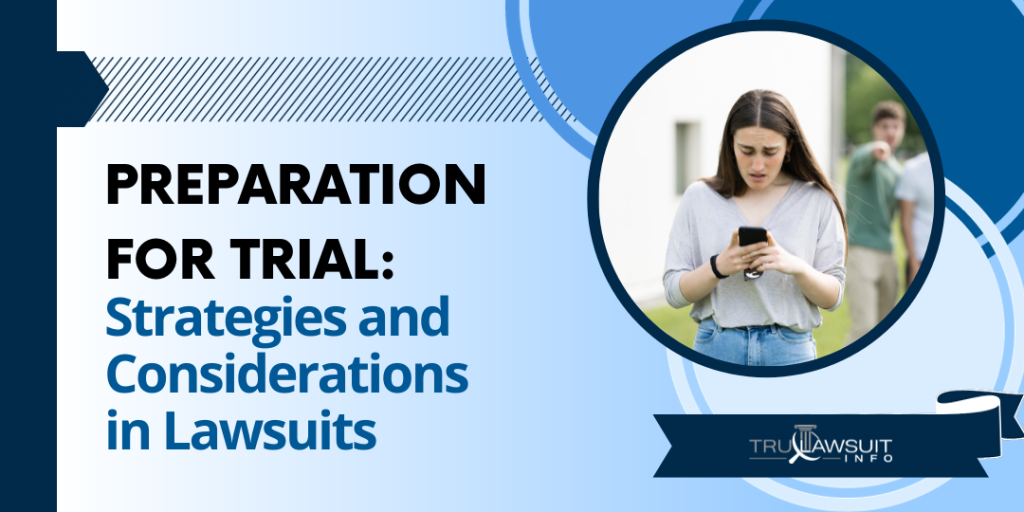
The discovery phase is also an integral part of any lawsuit.
This is where you’ll delve deeper into the facts and gather further evidence to support your case.
It’s important to remember that each step taken increases the chances of achieving justice and ensuring that harmful actions online are held accountable.
Don’t hesitate to take action if you or someone you know has suffered harm due to social media activities.
Frequently Asked Questions
-
What Constitutes Social Media Harm?
Social media harm refers to any damage (physical, emotional, or reputational) caused by activities on social media platforms, such as cyberbullying, defamation, or invasion of privacy.
-
How Do I Choose The Right Attorney For My Case?
Look for attorneys who specialize in Internet law or have experience handling similar cases.
They should have a good understanding of how social media platforms work and how they can be used in court proceedings.
-
Why Is Preserving Digital Evidence Important?
Digital evidence like screenshots or saved conversations can provide substantial proof during trials.
Therefore, it’s essential to preserve them immediately after noticing any harmful activity.
-
What Happens During The Discovery Phase?
During the discovery phase, both parties exchange information about their respective cases, including witnesses and evidence which will be used at trial.
-
Can I Settle My Case Outside Court?
Yes. In many instances, parties may agree upon a settlement outside court, which could include monetary compensation or other forms of resolution such as a public apology.

Experienced Attorney & Legal SaaS CEO
With over 25 years of legal experience, Jessie is an Illinois lawyer, a CPA, and a mother of three. She spent the first decade of her career working as an international tax attorney at Deloitte.
In 2009, Jessie co-founded her own law firm with her husband – which has scaled to over 30 employees since its conception.
In 2016, Jessie founded TruLaw, which allows her to collaborate with attorneys and legal experts across the United States on a daily basis. This hypervaluable network of experts is what enables her to share reliable legal information with her readers!
Have A Case?
Here, at Tru Lawsuit Info, we’re committed to helping victims get the justice they deserve.
To do this, we actively work to connect them with attorneys who are experts in litigating cases similar to theirs.
Would you like our help?
Tru Lawsuit Info is a reliable source of information about issues that may affect your health and safety, such as faulty products, data breaches, and environmental hazards.
Our team of experienced writers collaborates with medical professionals, lawyers, and advocates to produce informative articles, guides, and other resources that raise awareness of these topics.
Our thorough research provides consumers with access to reliable information and updates on lawsuits happening around the country. We also can connect consumers with attorneys if they need assistance.
Camp Lejeune's water contamination issue spanned several decades starting in the 1950s. Exposure to these chemicals has been linked to various serious health issues, including cancer, organ diseases, and death.
Research is increasingly suggesting a link between the use of Tylenol during pregnancy and the development of neurodevelopmental disorders, such as autism and ADHD, in infants.
Legal action is being taken against manufacturers of Aqueous Film-Forming Foam (AFFF), a chemical used in fighting fires. The plaintiffs allege that exposure to the foam caused health issues such as cancer, organ damage, and birth and fertility issues.
Have A Case?
Here, at Tru Lawsuit Info, we’re committed to helping victims get the justice they deserve.
To do this, we actively work to connect them with attorneys who are experts in litigating cases similar to theirs.
Would you like our help?







